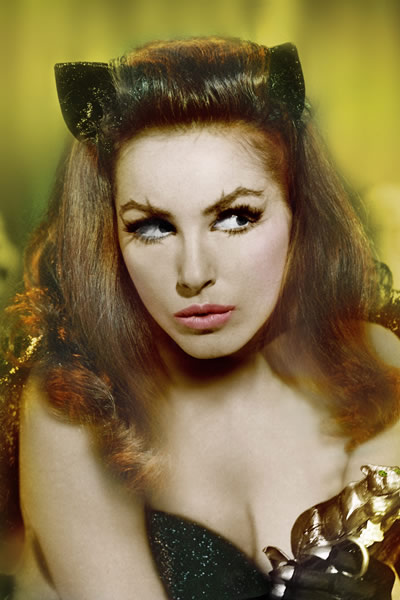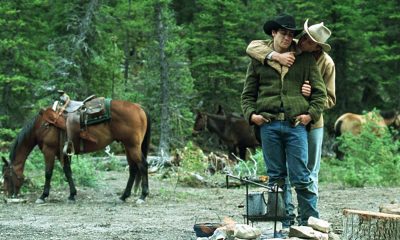Arts & Entertainment
Catching up with Catwoman
Actress Julie Newmar on camp, ‘Batman,’ advice for living and ‘To Wong Foo’

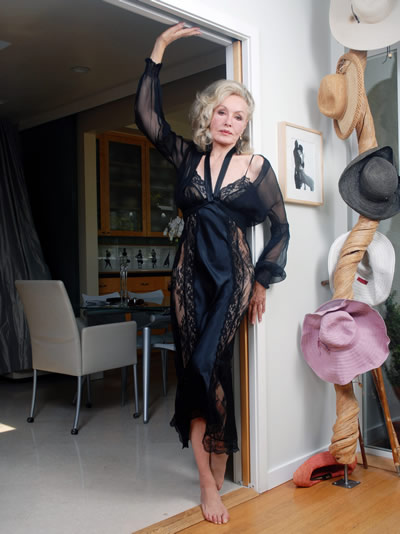
Actress Julie Newmar has discovered a passion for writing. Her advice book ‘The Conscious Catwoman’ is out now. She plans future books on gardening and childhood celebrity crushes. (Photo by Alan Mercer; courtesy Julie Newmar)
‘The Conscious Catwoman Explains Life on Earth’
By Julie Newmar
Eleven Books
75 pages
$18.95
julienewmarwrites.com
Fall’s a busy time and things only seem to accelerate as the year winds down and the holidays loom. So I’m taking care of some regretfully unfinished 2011 business.
Last September I spent a purrrrfectly — OK, sorry, couldn’t resist — delightful hour on the phone with Julie Newmar from her Los Angeles home about two miles from Brentwood. Everybody remembers her as Catwoman on the campy ‘60s TV show “Batman,” but serious fans know she’s also a Tony-winning actress who’s had triumphs on both stage and screen (both TV and film).
Unlike some actors who only begrudgingly acknowledge or discuss roles that, for whatever reason, got etched into the pop culture collective consciousness to a disproportionate degree, Newmar is happy to talk “Batman” and even called her 2011 book “The Conscious Catwoman Explains Life on Earth.”
It’s a 75-page wonder you think you’ll be able to plow through in an hour but it’s sneaky that way — I found myself spending an hour on each page, pondering the pearls of wisdom she shares. It’s also liberally peppered with eye-popping images of Newmar throughout her career as well as a playful series of mime-inspired photos that show the 78-year-old actress’s playful side.
Newmar says she’s always been a fan of how-to books and decided she’d lived enough life to share some tips. Most are hers but others she includes are from everything from the Bible to Voltaire to Carl Jung.
“I think after the age of 50 you start wondering why you became what you did and you start thinking about your life, what worked, what’s different,” she says. “I’ve always been in love with these how to books since I was in my teens. How to look better, how to not be frightened speaking in public or whatever … I’d had the idea for awhile but it takes time to do it the right way, so I took my time with it.”
Among her insights:
- Don’t try to be like others; you’ll not only be sorry, you’ll soon be out of fashion and the shallowness, the telltale marks of your insecurity, will show.
- You can bury a lot of troubles digging in the dirt (Newmar is an avid gardener)
- Life works once you get to be more in a state of gratitude than supplication or neediness.
- The important thing is to ask the right question — never mind the answer, it will drop in your lap.
- I hide my annoyance when people tell me, “But you can wear anything.” Anything is what I don’t wear.
- Every professions has its scullery duty.
“I love one liners,” she says. “Something you can peel off and put on the fridge or in the car. If you’re wanting to do better in life, you sort of collect these things over time and they stay with you. I think you cull your own garden in the sense there’s this assimilation of wisdom that takes place and can be very healing … you have to learn to love yourself as your maker does.”
Newmar happily answers any question I throw at her.
She says she “never ever” has felt frustrated by being so widely known as Catwoman, a recurring role she played in 12 episodes during the series’ first two seasons in 1966 and ’67. The famous body-hugging Lurex costume — reportedly made by Newmar herself — is now on display at the Smithsonian.
“It’s the first part of your house,” she says. “I’m lucky, fortunate and totally lucky to have something in my house that people know. Then you can invite them in and share the rest. I always look at the work as beneficial.”
And what of stars who reject their trademark roles or feel limited or typecast by them?
“It’s sad,” Newmar says. “It should always be seen as an opportunity. Strong people know how to take the negative and make it work for them, like making lemonade. I always like to look at things that way.”
Newmar attributes the character’s longevity to her bevy of traits.
“She’s very bright, savvy, smart. She wears high, daunting heels. She looks good from the front and back. She’s got a cute ass. She’s fun to play with. Naughty.”
The actress didn’t grow up with cats. Her mother had a wire-haired Terrier named William Powell (named after the “Thin Man” actor) but during the time she played the part, Newmar adopted two cats from actress June Havoc and observed their behavior.
“I’d wander over and watch them eat and play and frolic around. You do your homework.”
And how intentional was the camp quotient at the time? Were the actors encouraged to ham it up?
“It doesn’t matter what it looks or sounds like, whether it’s camp, straight or this, that or the other,” she says. “You still have to find the truth in it. You play the truth, then the rhythm seeps in and you go with it.”
Newmar, who introduced the part, had other projects brewing at the time so she didn’t feel especially connected to the role until later. Former Miss America winner Lee Meriwether played Catwoman in a 1966 film version that starred most of the TV series cast, but then Newmar was back in the role for the show’s second season. And in a performance perhaps as indelible as Newmar’s, the late Eartha Kitt played the character in the third and final season. Newmar, who was photographed for USA Today with Meriwether and Kitt in 2004 around the time the Halle Berry movie came out, says she “loved” Kitt in the part and owned several of Kitt’s albums at the time. She says Michelle Pfeiffer had the best Catwoman costume, but says the Berry film “didn’t quite come together.” She’s “100 percent” supportive of Anne Hathaway in the latest version, “The Dark Knight Rises,” slated for a July release.
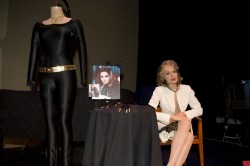
Newmar as one of nine 'Legendary Ladies of Stage & Screen' during a Smithsonian presentation of her famous catsuit in 2008. (Photo courtesy Harlan Boll)
“I think our show worked because, well, color was pretty new on TV at the time and it just seemed to sit really well within the confines of a television screen. The excesses of it, the booms and bams, it just fit so very well and you could just imagine the little kids sitting there on the floor with their eyes wide open. The color really popped. I really think that was a big part of it — they made extraordinary use of the color. I’d just done ‘My Living Doll,’ but that was in black and white. This became far more popular.”
Newmar is a bit taken aback when I ask if her hair being longer in the second season — it went from a flip to a much longer, past-the-shoulders look in the later episodes — is intentional. She says no significant thought was put into it — just a reflection of the changing styles. The initial look, sort of vaguely Jackie inspired, was a sign of the times. Longer hair was more popular in the late ’60s. Newmar remembers doing her own makeup — “nothing terrifically trend setting,” she notes — on the show. “Nobody ever asked me that before,” she says.
Of her dozens of television guest appearances, she says her famous “Twilight Zone” episode (she played the devil in the season four episode “Of Late I Think of Cliffordville”) is especially memorable. She met creator/writer/host Rod Serling during the filming and remembers his trademark cigarette smoking and “oh, that brilliant mind — that marvelous, marvelous man. Aren’t we grateful that we have this and that they kept these films? I remember shooting in this small little theater on 44th Street under the New York Times. It was all about story on that show.”
She also remembers her “Batman” costars fondly — she calls Adam West (Batman) “darling, a doll,” and says Burt Ward (Robin) was “perfect. He wasn’t an actor at all. He was 19 at the time and they found him in a gym.”
Newmar next plans a book about celebrity crushes. She’s widely credited — anecdotally at least — with having awoken the hormones of practically a whole generation of American straight boys on “Batman.” She considers it a paradoxical wonder that her gay appeal — they wanted to have her, we wanted to be her — is perhaps equally as strong.
And, of course, we can’t let Miss Newmar go without asking her about her eponymous drag film “To Wong Foo.” She chuckles at the memory.
Foo, it seems, was the owner of a Chinese restaurant in New York that’s no longer in business. It was near Sardi’s on 44th Street. Legend has it screenwriter Douglas Beane saw an autographed photo of Newmar there and the sheer wackiness of its inscription jumped out at him.
“He probably made it up,” Newmar says with a laugh. “I don’t remember doing it. I think he just thought if he gave it an innocuous little title it wouldn’t make it out of the stack on some producer’s desk so he gave it this crazy title. And sure enough, it did make it out of the stack.”
And one more “Batman” question — of either her show or the characters in general, is there a homoerotic subtext between Batman and Robin?
“I don’t think so,” Newmar, whose brother is gay, says first, then backpedals. “Well maybe. I think anytime something is too straight, we want to throw a snowball at it. We crave some alternate. Thank God we can have both gay and straight.”
Arts & Entertainment
2026 Most Eligible LGBTQ Singles nominations
We are looking for the most eligible LGBTQ singles in the Washington, D.C. region.

Are you or a friend looking to find a little love in 2026? We are looking for the most eligible LGBTQ singles in the Washington, D.C. region. Nominate you or your friends until January 23rd using the form below or by clicking HERE.
Our most eligible singles will be announced online in February. View our 2025 singles HERE.
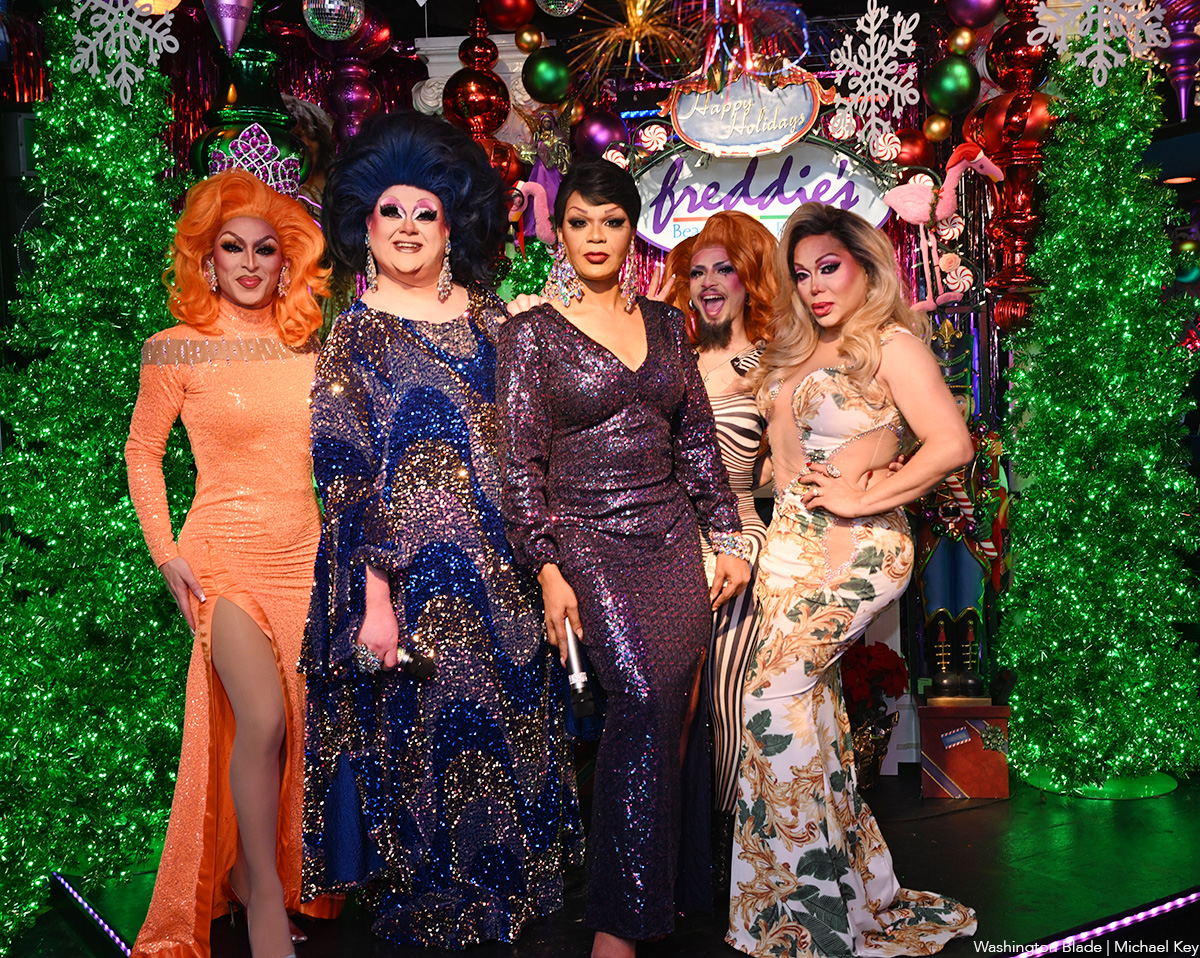
The Freddie’s Follies drag show was held at Freddie’s Beach Bar in Arlington, Va. on Saturday, Jan. 3. Performers included Monet Dupree, Michelle Livigne, Shirley Naytch, Gigi Paris Couture and Shenandoah.
(Washington Blade photos by Michael Key)

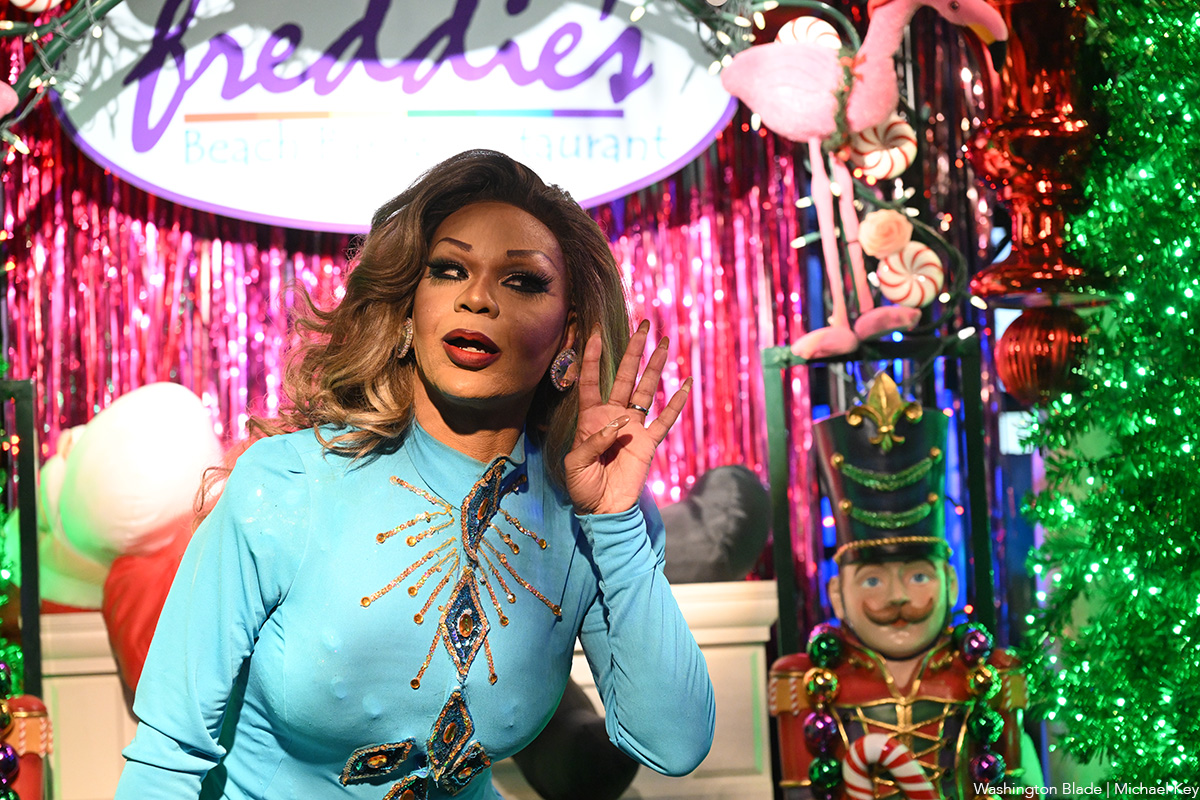





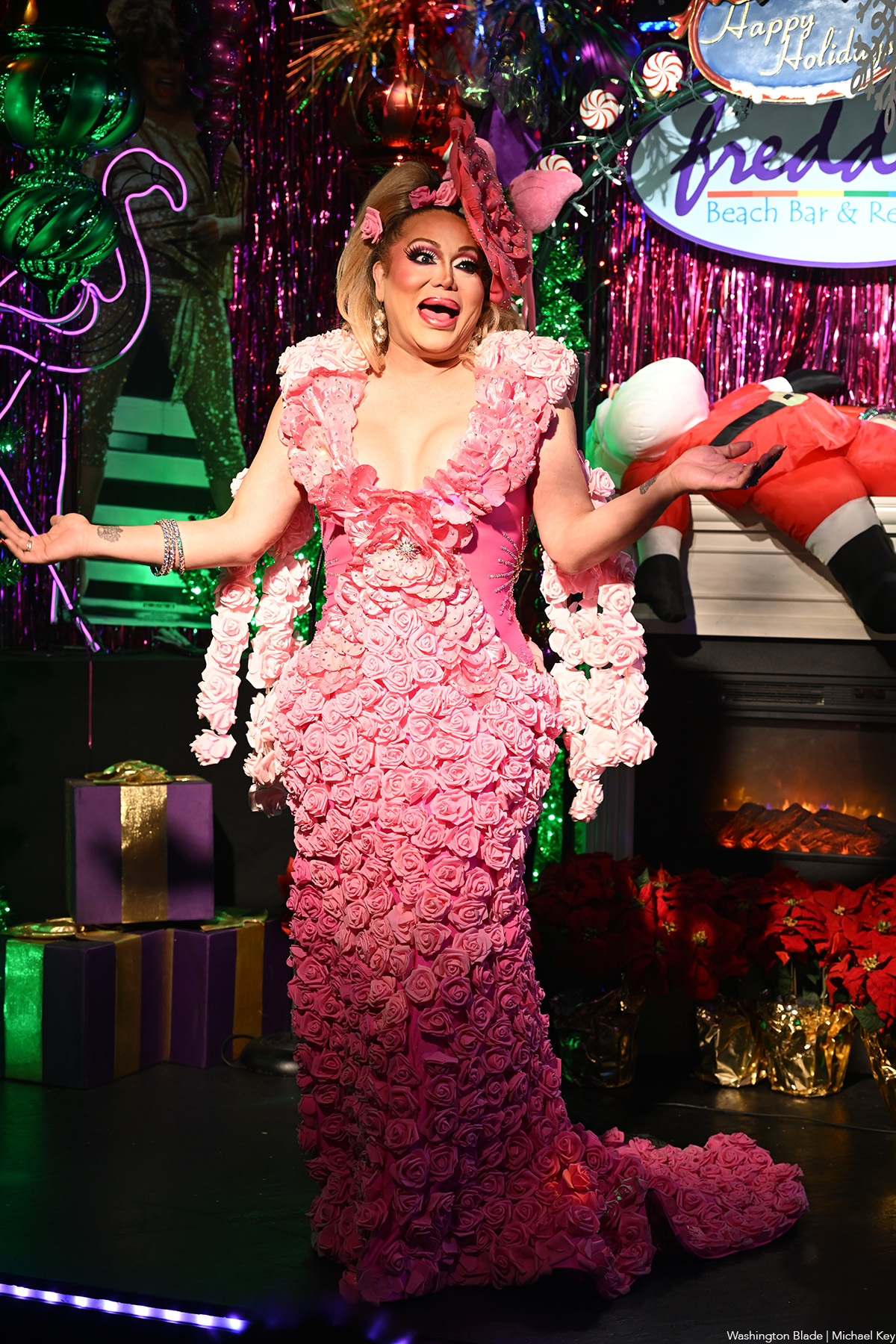
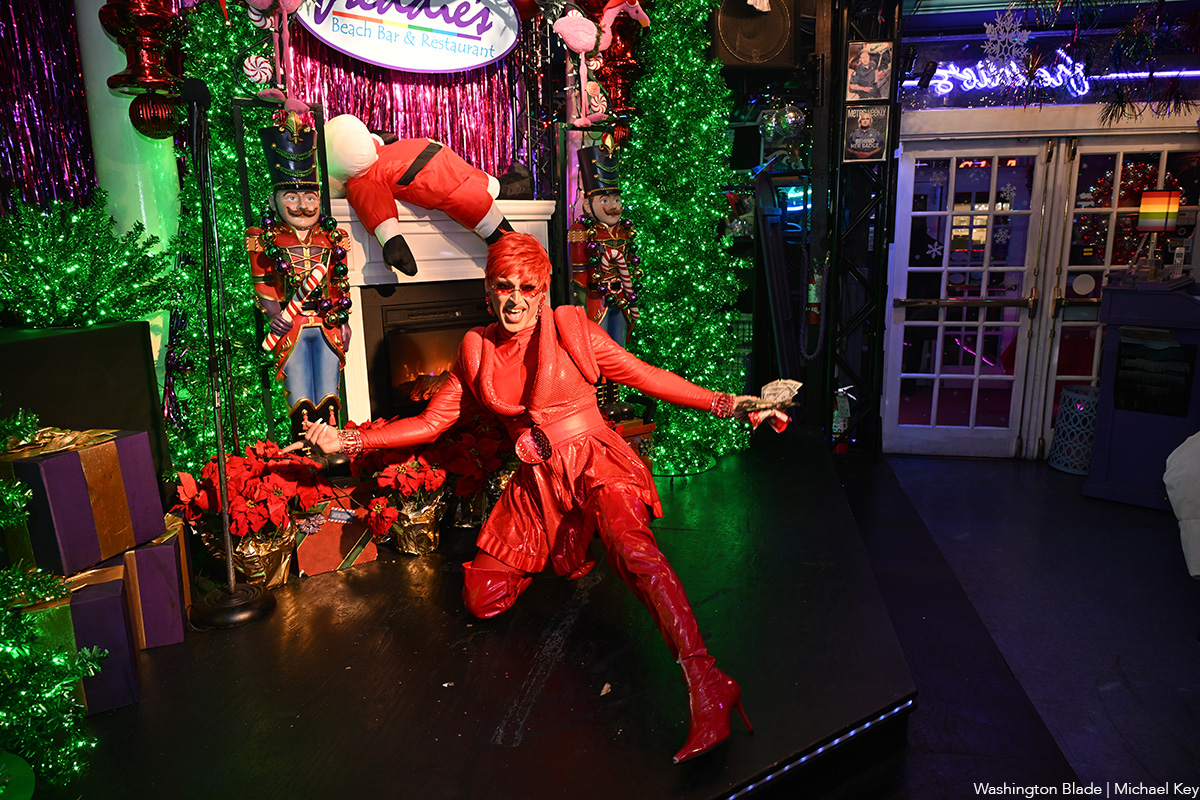
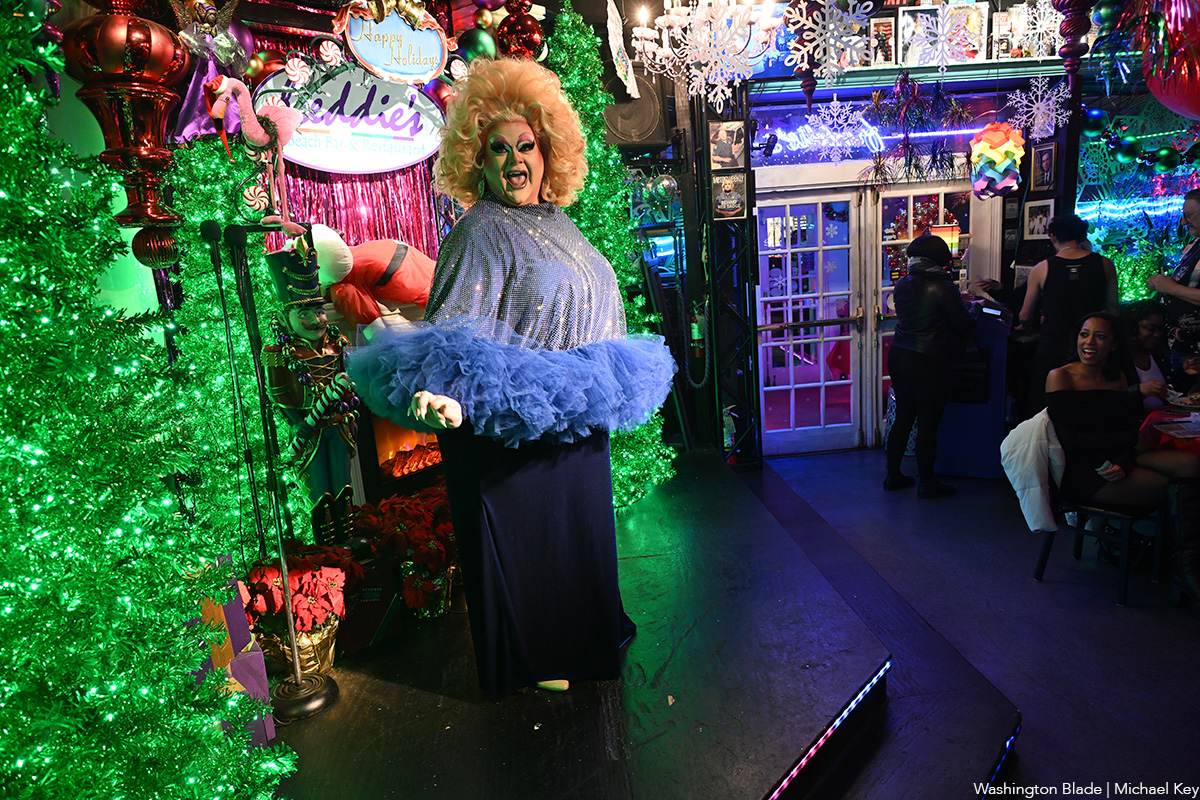
a&e features
Queer highlights of the 2026 Critics Choice Awards: Aunt Gladys, that ‘Heated Rivalry’ shoutout and more
Amy Madigan’s win in the supporting actress category puts her in serious contention to win the Oscar for ‘Weapons’

From Chelsea Handler shouting out Heated Rivalry in her opening monologue to Amy Madigan proving that horror performances can (and should) be taken seriously, the Critics Choice Awards provided plenty of iconic moments for queer movie fans to celebrate on the long road to Oscar night.
Handler kicked off the ceremony by recapping the biggest moments in pop culture last year, from Wicked: For Good to Sinners. She also made room to joke about the surprise hit TV sensation on everyone’s minds: “Shoutout to Heated Rivalry. Everyone loves it! Gay men love it, women love it, straight men who say they aren’t gay but work out at Equinox love it!”
The back-to-back wins for Jacob Elordi in Frankenstein and Amy Madigan in Weapons are notable, given the horror bias that awards voters typically have. Aunt Gladys instantly became a pop culture phenomenon within the LGBTQ+ community when Zach Cregger’s hit horror comedy released in August, but the thought that Madigan could be a serious awards contender for such a fun, out-there performance seemed improbable to most months ago. Now, considering the sheer amount of critics’ attention she’s received over the past month, there’s no denying she’s in the running for the Oscar.
“I really wasn’t expecting all of this because I thought people would like the movie, and I thought people would dig Gladys, but you love Gladys! I mean, it’s crazy,” Madigan said during her acceptance speech. “I get [sent] makeup tutorials and paintings. I even got one weird thing about how she’s a sex icon also, which I didn’t go too deep into that one.”
Over on the TV side, Rhea Seehorn won in the incredibly competitive best actress in a drama series category for her acclaimed performance as Carol in Pluribus, beating out the likes of Emmy winner Britt Lower for Severance, Carrie Coon for The White Lotus, and Bella Ramsey for The Last of Us. Pluribus, which was created by Breaking Bad’s showrunner Vince Gilligan, has been celebrated by audiences for its rich exploration of queer trauma and conversion therapy.
Jean Smart was Hack’s only win of the night, as Hannah Einbinder couldn’t repeat her Emmy victory in the supporting actress in a comedy series category against Janelle James, who nabbed a trophy for Abbott Elementary. Hacks lost the best comedy series award to The Studio, as it did at the Emmys in September. And in the limited series category, Erin Doherty repeated her Emmy success in supporting actress, joining in yet another Adolescence awards sweep.
As Oscar fans speculate on what these Critics Choice wins mean for future ceremonies, we have next week’s Golden Globes ceremony to look forward to on Jan. 11.
-

 Photos4 days ago
Photos4 days agoThe year in photos
-

 Sponsored3 days ago
Sponsored3 days agoSafer Ways to Pay for Online Performances and Queer Events
-

 District of Columbia2 days ago
District of Columbia2 days agoTwo pioneering gay journalists to speak at Thursday event
-

 a&e features2 days ago
a&e features2 days agoQueer highlights of the 2026 Critics Choice Awards: Aunt Gladys, that ‘Heated Rivalry’ shoutout and more

